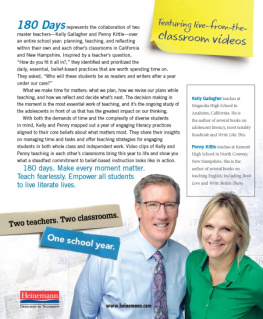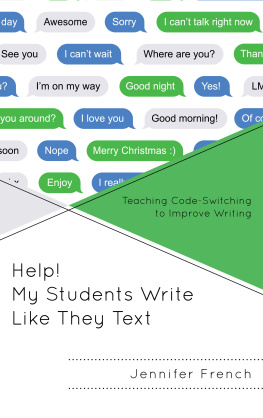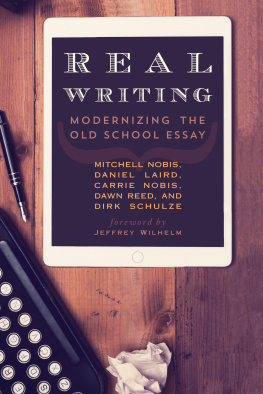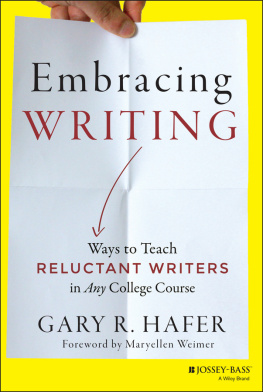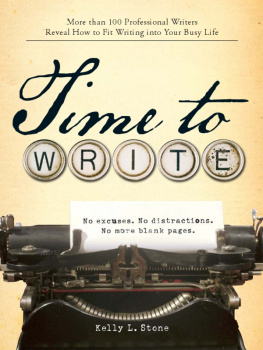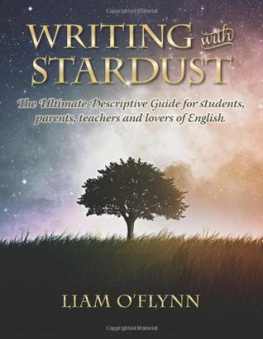WRITE LIKE THIS
TEACHING REAL-WORLD WRITING THROUGH MODELING & MENTOR TEXTS
KELLY GALLAGHER

Stenhouse Publishers
www.stenhouse.com
Copyright 2011 by Kelly Gallagher
All rights reserved. Except for pages in the appendix, which may be photocopied for classroom use, no part of this publication may be reproduced or transmitted in any form or by any means, electronic or mechanical, including photocopy, or any information storage and retrieval system, without permission from the publisher.
Every effort has been made to contact copyright holders and students for permission to reproduce borrowed material. We regret any oversights that may have occurred and will be pleased to rectify them in subsequent reprints of the work.
Credits are on page 264.
Library of Congress Cataloging-in-Publication Data
Gallagher, Kelly, 1958
Write like this : teaching real-world writing through modeling and
mentor texts / Kelly Gallagher.
p. cm.
Includes bibliographical references and index.
ISBN 978-1-57110-896-8 (pbk. : alk. paper)ISBN 978-1-57110- 933-0 (e-book)
1. English languageComposition and exercisesStudy and teaching (Secondary) 2. English languageComposition and exercisesStudy and teaching (Middle school) I. Title.
LB1631.G163 2011
428.00712dc23
2011022785
Cover design, interior design, and typesetting by Martha
Drury Manufactured in the United States of America

17 16 15 14 13 12 11 9 8 7 6 5 4 3 2 1
For those at National Writing Project sites fighting for survival
and
for the people in my life who taught me to write like this.
Contents
Chapter 9: The Wizard of Oz Would Have Been
a Lousy Writing Teacher
Acknowledgments
Without the contributions of the following people, you would not be holding this book in your hands:
My wife, Kristin, whose behind-the-scenes support enabled me to write this book while teaching full time.
My daughters, Caitlin and Devin, for whom my love is immeasurable.
My mom and dad, for everything.
Bill Varner, my editor at Stenhouse, for his wisdom and oversight. This week, his Red Sox swept a four-game series from my Angels, yet Bill continued editing this book without a hint of gloating. Now that is a professional editor. Thank you, Bill, for making this a better book.
The good folks at Stenhouse, including Jay Kilburn for his excellent design work, Chris Downey for her keen copyediting eye, Jill Cooley for tracking down all of those permissions, and Rebecca Eaton, Zsofi McMullin, Chandra Lowe, and Chuck Lerch for their marketing acumen. I would also like to thank Nate Butler for being Nate Butler. Thanks always to Philippa Stratton and Dan Tobin.
My colleagues in the Magnolia High School English Department, specifically Amie Howell, for bringing the six-word memoir to my attention; Lindsay Ruben, for sharing her student work in these pages; Robin Turner, for his birth-order lesson; and Michelle Waxman, for sharing student samples of her song analysis unit. Thanks also to Helen Chung, Melissa Hunnicutt, Virginia Kim, Katrina Mundy, Esther Noh, Kallie Pappas, Sherri Rothwell, Carrie Saleman, Margaret Tagler, Sarah Valenzuela, and Dana White. It is not easy working in the pressure cooker of a struggling school, and I admire the dedication and professionalism each of you bring daily to your classrooms.
You too, Seor Puente.
A special thanks to my principal, Robert Cunard, who, by composing a weekly letter to the Magnolia High School faculty, models the value of writing. How many principals out there can quote William Shakespeare and Harmon Killebrew with equal aplomb?
John Powers, who many years ago introduced Lord Byrons Darkness to me. I am still teaching your lesson, John.
Stephanie Sullivan for her encouragement from afar, and for sharing Joan Steiners hidden pictures with me.
Franki Sibberson, who taught me to write in 140 characters or less.
All the other writers who have, one way or another, exerted influence on the writing of this book: Penny Kittle, Tom Newkirk, Nancie Atwell, Ralph Fletcher, Jon Scieszka, The Sisters (Gail Boushey and Joan Moser), Debbie Diller, Debbie Miller, Laura Robb, John Bean, Virginia Chappell, Alice Gillam, Greta Vollmer, Liz Simon, Mary K. Healy, Regie Routman, Lynne Dorfman, Rose Cappelli, and Frank Serafini. My deepest thanks. I am sure there are others whom I have forgotten to list here. My deepest apologies.
Jeff Anderson, who helped me to understand that the line between revision and editing often gets blurry.
Tammy Lakes and the folks at Pearson for granting permission to use the RADaR revision logo and the works cited guide.
And perhaps most important, I am deeply indebted to my students in room 301, who incessantly wrote, even on days when the syrup would not pour.
Chapter 1
Moving Writing to the Front Burner
Do your students write well enough to become police officers?
Before answering, it might be helpful to know that as part of the application process, candidates for the California Highway Patrol (CHP) take an examconsisting of both a multiple choice section and a written sectionthat specifically measures three elements of writing ability: clarity, vocabulary, and spelling. The exam emphasizes understanding where to place modifiers, how to avoid vague or indefinite references, and how to keep within conventional sentence boundaries by avoiding fragments and run-on sentences. Here, for example, are some questions found on a recent exam:
In each of the pairs below, identify the sentence that is most clearly written:
A. Bullet fragments were gathered by officers in envelopes.
B. Bullet fragments were gathered in envelopes by officers.
A. The next time Mary was in town, she agreed to have lunch with Sue.
B. Mary agreed to have lunch with Sue the next time she was in town.
A. The position requires that the incumbent type, file, and prepare travel expense claims in addition to acting as the receptionist for the organization.
B. The position requires that the incumbent type, file, and prepare travel expense claims. In addition to acting as the receptionist for the organization.
In each of the following sentences, choose the word or phrase that most nearly has the same meaning as the underlined word:
It was not a very pragmatic idea.
A. plausible
B. serious
C. practical
D. sensible
The police sequestered the suspect.
A. caught
B. isolated
C. arrested
D. released
In the following sentence, choose the correct spelling of the missing word:
She was a ______ worker.
A. conscentious
B. conscintious
C. consceinteous
D. conscientious
Source:www.post.ca.gov/selection/poWrittenPracticeTest.pdf
In addition, applicants are encouraged to know common prefixes, suffixes, and roots in preparation for the exam.
All of these questions about writing are followed by an on-demand written assessment. Here is a sample prompt:
Events or situations in our lives often produce unexpected responses. We may find ourselves reacting in better or worse ways than we would have thought. Write about a time when your reactions to an event or a situation in life were not what you would have expected. Describe the event and explain how your response surprised you.


